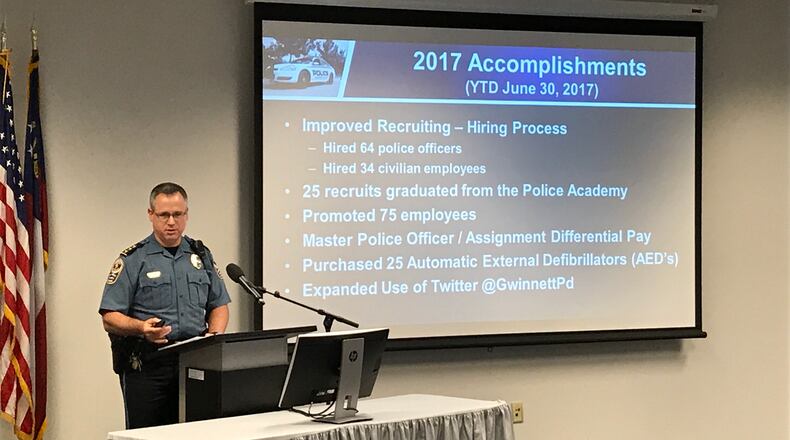Chief Butch Ayers wants a real, bonafide raise for the men and women of the Gwinnett County Police Department, an agency with years-long attrition issues and low pay compared to its metro Atlanta counterparts.
“Other departments solve their attrition problems by cherry picking our officers,” Ayers said. “We have to be in the game as well.”
Ayers delivered his 2018 budget proposal this week in front of Commission Chairman Charlotte Nash and a seven-member review committee. He asked for the authorization, and money, to create 30 new positions.
In a department that already has more than 100 vacancies, those positions would likely be difficult to fill. So when Nash asked Ayers if he'd rather have them or "compensation improvements" for his existing staff, he didn't hesitate.
Nash played coy with details this week, but confirmed that the county is considering some type of pay raise to both recruit new officers and keep experienced ones around longer. When her commission adopted in July a slightly higher millage rate, she suggested that the additional tax collections could help fund such a decision.
The beefed up recruitment efforts that have begun in recent months seem to be helping a bit, as do more stop-gap type of pay increases that have been adopted for certain experienced officers. But the quickest way to tackle his department's struggles with hiring and retaining officers, Ayers said, would no doubt be an across-the-board increase in pay.
Gwinnett currently offers a starting salary of just over $36,000 for candidates who aren’t already trained and certified.
Earlier this year, The Atlanta Journal-Constitution found that similar positions start at $43,000 in Dunwoody, $41,000 in Sandy Springs and $40,000 in the city of Atlanta. The DeKalb and Cobb County police departments both start non-certified recruits at $38,000.
“We want to recruit people at the beginning,” Nash said, “but we also want to keep people as we go.”
Both tasks have been difficult in recent years.
‘Where we dream about being’
Ayers and others blame GCPD’s staffing issues on several things.
Those include a hypercompetitive job market (driven in part of by new municipal police departments, most of which offer better pay) and a general disinterest in the profession. The latter is fueled largely by high-profile, racially charged incidents across the country — including one in which two white Gwinnett cops were fired after assaulting a black motorist.
“No one thing is really it” in Gwinnett or elsewhere, said Ron Hunter, a former police officer and scholar who started the criminal justice program at Georgia Gwinnett College. “But when you start adding them up…”
And while the attrition problem is not a unique one to GCPD, its statistics are startling.
GCPD is authorized to have 789 sworn officers, but currently has 679 on staff to serve the roughly 800,000 Gwinnettians in the department’s jurisdiction (some of the county’s residents are covered by municipal police departments). That’s a ratio of about 0.85 officers per 1,000 residents — well below the nationwide average of 1.7 reported in 2015 by the U.S. Department of Justice.
The county’s own 2030 Unified Plan calls for a minimum staffing ratio of 1.10 — a number whose achievement would currently require hiring 199 new officers. The recommended staffing ratio, 1.30, would require somehow hiring even more.
The same officer-to-population ratio for Cobb County and DeKalb County PDs is 1.25 and 1.29, respectively, according to statistics Ayers presented Wednesday.
“They’re where we dream about being,” Ayers said.
Other local departments have such strong ratios that, at this point, they’re beyond even fantasizing about. The average ratio for Gwinnett’s city police departments is 2.24. Atlanta PD’s ratio is 3.86.
Keeping up the pace
Thus far, Gwinnett doesn’t seem to be experiencing any significant fallout, crime-wise, from its lack of police staffing.
Hunter said such a shortage in a place like Gwinnett, which already has relatively low crime rates, is more likely to manifest itself in areas like response times and the availability of back-up units. He said the local department is “making the moves in the right direction” by offering things like a new “master police officer” rank and additional pay for work on specialized units.
Hunter said raises for the entire department would help attract more officers and keep others around. That’s important, he said, because Gwinnett isn’t getting any smaller either.
“That will put an agency trying to catch up constantly,” Hunter said.
Gwinnett is predicted to add another 400,000 people and become the most populous county in Georgia by 2040. The vast majority of the 1.35 million residents predicted to live in Gwinnett will fall under GCPD's jurisdiction.
“As the population increases, the demands for police service are going to increase,” Ayers said. “And we’re just not going to be able to keep up the pace.”
MYAJC.COM: REAL JOURNALISM. REAL LOCAL IMPACT.
The AJC's Tyler Estep keeps you updated on the latest happenings in Gwinnett County government and politics. You'll find more on myAJC.com, including these stories:
Never miss a minute of what's happening in Gwinnett politics. Subscribe to myAJC.com.
In other Gwinnett news:
About the Author
Keep Reading
The Latest
Featured






